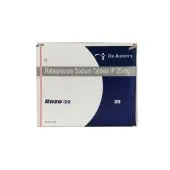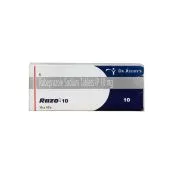Acid reducers

-

-
 Acicaine Oral Gel 200 ml Oxetacaine + Aluminium Hydroxide + Magnesium 1 Bottle/s : $7.42Out of stock
Acicaine Oral Gel 200 ml Oxetacaine + Aluminium Hydroxide + Magnesium 1 Bottle/s : $7.42Out of stock -

Acid Reducers
Acid reducers or antacids are alkaline drugs that reduce the amount of acid secreted by the stomach in order to reduce the risk of ulcer and heartburn pain or to assist in the healing of ulcers. These chemicals are used to treat stomach and duodenal (intestinal) ulcers and prevent them from recurring. It is also used to treat gastroesophageal reflux disease (GERD). They are also used to prevent indigestion, heartburn, and upset stomach when they are associated with eating food or drinking beverages.
Reasons For Acid Reflux
There are various causes of stomach problems, you may or may not experience all of them at the same time. Some common causes of stomach problems are listed below-
-
Several food items can cause stomach abnormalities like citrus, tomatoes, chocolates, garlic, onion, and spicy foods
-
Obesity
-
Eating large quantities of food especially spicy food
-
Drinking too many alcoholic beverages and caffeinated drinks like coffee or tea
-
Being pregnant
-
Taking aspirin, ibuprofen, and certain blood pressure medications
-
Excessive smoking
-
Eating stale food
-
Seasonal changes
Symptoms Of Acid Reflux
-
Nausea or recurrent upset stomach
-
Abdominal bloating
-
Abdominal pain
-
Vomiting
-
Indigestion
-
Burning or gnawing feeling in the stomach between meals or at night
-
Hiccups
-
Loss of appetite
-
Vomiting blood or coffee ground-like material
-
Black, tarry stools
Adverse Effects On Body
In case too much acid gets accumulates in your body, you can be diagnosed with a condition called acidosis. Typically, acidosis develops as a result of uncontrolled diabetes; chronic diarrhea; and respiratory, kidney or liver disease.
The effects of acidosis may be life-threatening if the condition gets severe and can lead to adverse effects of excess acid are-
-
Upset Stomach
-
Headache, Weakness or Fatigue
-
Breathing Difficulties
-
Confusion
-
Shock, Coma, or Death
Preventive Measures
You can prevent diseases related to the stomach just by maintaining proper dietary and lifestyle habits that disturbed the gastrointestinal tract to give digestive disease symptoms.
-
Quit smoking
-
Exercise lightly five days each week
-
Avoid alcohol use
-
Eat a high-fiber, healthy diet
-
Cut high-fat and acidic foods from your diet
-
Know your system’s capacity- do not overeat
-
Avoid regular use of aspirin, steroids, and sulpha drugs (unless told otherwise by your doctor)
-
Get medical approval before starting or ending any medical diet
Common Medications
-
Domperidone
-
Famotidine
-
Ranitidine
-
Rabeprazole
-
Omeprazole
You can buy acid reducers online from any reliable online drugstore. Make sure that the products are not duplicate as they can react adversely with your body.
Myths/Facts
MYTH- Milk soothes Acid Reflux
FACT- Milk may neutralize your stomach acid temporarily, but your stomach will soon produce more. Similarly, mint can also do more harm than good. Try licorice instead.
MYTH- Acid Reflux Occurs Due to a Poor Diet
FACT- While it’s true that some foods may aggravate your acid reflux symptoms, diet isn’t really the culprit here. Rather, it is found that being physically more active works better than ditching products like chocolate, caffeine, etc, if you want long term relief from acid reflux.
MYTH- Only spicy food can cause acid reflux
FACT- greasy and fatty food are undoubtedly a trigger to acid reflux, but the ultimate reason varies from person to person. It can be anything, including smoking, asthma, diabetes, coffee, alcohol, and so on. You have to track your trigger by noticing your experiences of acid reflux.
MYTH- Ditch all the proteins to heal acid reflux
FACT- Not every kind of protein is harmful to a person suffering from acid reflux. One just needs to cut down ‘meat proteins’ from his/her diet. Food items like peanut butter, hummus, and soy can be consumed in an appropriate quantity.
Things To Know Before Using Acid Reducers
-
Never take the medicine continuously for more than 14 days
-
Look for warnings and usage instructions when to plan to buy acid reducers online
-
Pregnant ladies and mothers who are breastfeeding should avoid the use of the drug so as to avoid any complications during pregnancy or lactation.
Drug Interactions
Consult your doctor and get your medical diet checked with him before consuming acid reducers for a long time, as they may react adversely with the drugs mentioned below. Please note that this list is not a complete one, and is intended for reference purposes only. Check with your healthcare provider if you are eligible to take acid reducers. Do not start, stop, or change the dosage of any medicines without your doctor's approval.
Some products need stomach acid so that the body can absorb them properly. Acid reducers decrease stomach acid, so it may change how well these products work. Some affected products include atazanavir, dasatinib, delavirdine, azole antifungals (such as itraconazole, ketoconazole), pazopanib, among others. Do not fuse acid reducers with drugs like cimetidine, famotidine, and nizatidine.
When used in the long term, acid reducers may also interfere with certain laboratory tests related to protein and can result in false test reports. Let your healthcare provider know about your medical diet and the drugs you are administering.













